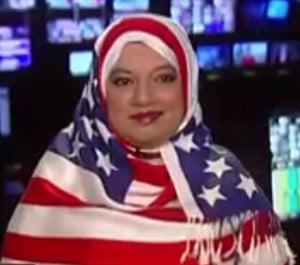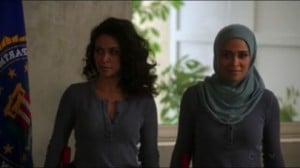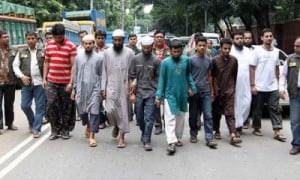I spent this past weekend at the Reviving the Islamic Spirit convention in Toronto. In its seventh year, the conference brings together thousands of people from all over North America (I think someone said that about 15 thousand people came to this year’s conference), and some of the best-known Islamic scholars. This year’s lineup included Shaykh Hamza Yusuf, Imam Zaid Shakir, Professor Tariq Ramadan, and many others.

This was my second time at the conference, and it was a powerful experience overall. The people organising did an amazing job, masha’Allah, and a lot of the speakers were really inspiring. This is MMW, so I’m sure you know that there are some critiques coming as well, but I do want to emphasise that I’m not trying to bash the conference as a whole (my criticism is also something that I will be sending to the conference organisers, so hopefully it will be used for something productive rather than just venting.) It’s rare to have so many of those speakers all in one place, and to be able to benefit from all of their dedicated scholarship, and I’m glad that I was able to go.
On the other hand, missing from that list were any female scholars. Yes, there were female speakers, and I’ll talk about them in a moment, but neither one could be considered an Islamic scholar in any way. This does not, of course, detract from the value of any of the individual male scholars, but I was disappointed that the ensemble of scholars was entirely male. Despite the fact that some of the scholars (Yahya Rhodus, Muhammad Ibn Adam) talked about the importance of the contributions to Islamic scholarship made by the wives of the Prophet (peace be upon him), and that other scholars (Tariq Ramadan, Tareq AlSuwaidan) talked about the importance of female leadership, we were not able to see this in action at this particular conference. It’s hard to really internalise the points that these speakers were making, about female participation in the public domain being integral to Islam, when there were so little examples of this in practice.
I don’t know whether the organisers made any kind of effort to try to have female scholars present, but I would argue that this is a pretty important point, and that there should have been a really intense effort. The audience was over 50% female, and it’s really problematic to not see a single example of a female voice as an accomplished scholar of Islam. Yes, it’s true that many female scholars are less well-known and don’t attract as many people as some of the big male names, but at the same time, if they are continually excluded from conferences like this, it’s going to be impossible for them to build a big name. It’s not very encouraging to potential future women scholars if they come to a conference like this and understand the realm of Islamic scholarship to be an exclusively male one. I would love to see a conference like this taking the initiative to seek out some of the many women who are doing really interesting work in Islamic scholarship, and to make a point of supporting them. (Or, at the very least, academic work related to Islam, even if it’s not considered to be traditional Islamic religious scholarship.) Personally, the lack of women on the conference lineup made me think twice about attending; I have another friend whose decision not to come back early from a family event for the convention was directly influenced by the absence of female scholars.
At the same time – it’s sad that this has to seem like a positive point worth mentioning – I was glad to see female MCs throughout the day, and a couple of female speakers. Clearly, the conference organisers didn’t feel that there were inherent problems with having women on stage. Last year, Dr. Jamillah Karim gave an amazing presentation at the same convention, so there have been past examples (however few) of women presenting form a more academic perspective.
The two women that were present were Monia Mazigh and Hanan Turk. Both of them told personal stories of their own life expereinces, in contrast to the male speakers, who all spoke about broader principles and stories that were much more widely applicable. Of course, personal stories are interesting and they do have their place, but it’s frustrating that the divide between women sharing their own experiences and men speaking on topics that can apply to everyone was so stark.

Mazigh is famous for the work that she did when her husband, Maher Arar (a Canadian citizen), was stopped in a U.S. airport on the way back to Canada, and deported to Syria, where he was tortured for several months. Mazigh and her husband were both on stage, and talked about her experiences fighting for Arar’s freedom, while struggling with suddenly having to take care of their young children all on her own. I really liked their talk, and Mazigh’s story was very powerful.
Hanan Turk’s talk was less impressive. First of all, she spoke only in Arabic, and in order to hear a translation, we had to rent headsets. (For those of you cringing at this as yet another example of non-Arab/non-Arabic-speaking Muslims ending up as second-class citizens at Muslim events, yeah, I’m with you.) For reasons I can’t exactly remember, a friend and I ended up sitting through her whole talk, despite the fact that neither of us understands much Arabic, and we didn’t want to pay to rent the headsets. What I got out of her talk was basically that she had been searching for happiness in her life as an actress, but eventually found happiness instead in connecting to her Islamic faith. A big part of the talk focused on her decision to start wearing hijab, and how important this was to her.

To be clear, I’m not contesting Turk’s opinions on hijab, or challenging the importance of the headscarf in the beliefs and practices of many Muslim women. She certainly did sound as if becoming more religious (and her decision to express this through wearing a scarf) has had a really important effect in her life, and alhamdulillah, that’s awesome. What drives me crazy though is that the one main featured female speaker was, first of all, inaccessible to a large part of the audience (because of language); second, that while all the male speakers were focused on broader issues, hers was a fairly simple personal narrative; and third, that the emphasis on hijab made it seem like this is the most important part of a Muslim woman’s life and practice, or the most important action for Muslim women to do.
Last year’s RIS convention had a really good panel on why we need to move on from hijab conversations towards talking about bigger issues, so this talk felt like a bit of a regression from last year. It was just so essentialist, as if the best thing that a Muslim woman can do is put on a headscarf. Sigh. I mean, if this represents such a big accomplishment, then there were thousands (literally) of girls there who could have been up on stage telling their own stories of why they wear the scarf. Of all the amazing Muslim women out there in the world, they had to pick someone whose main accomplishment seems to be that she left the world of acting to become a practising, hijab-wearing Muslim?
So, MMW readers, a question for you. Who would be on your wish list, if you were to go to a conference? Which female scholars, activists, writers, etc., would you like to see?














